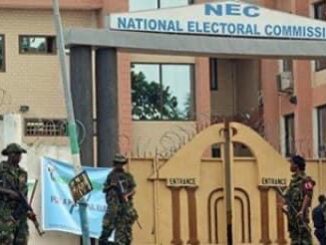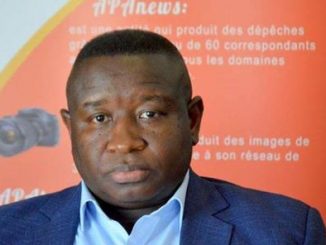
PERMANENT MISSION OF THE REPUBLIC OF
SIERRA LEONE TO THE UNITED NATIONS
245 East 49th Street, New York NY 10017
STATEMENT
by
H.E. MR. AMADU KOROMA
Deputy Permanent Representative
Open Debate at the
Thirteenth Session of the Assembly of States Parties to the Rome Statute
of the International Criminal Court
New York, 11th December 2014
Check Against Delivery
Mr. President,
Let me at the outset reiterate the deep commitment and support of my country, Sierra Leone for the International Criminal Court. We are deeply honored to participate in the Open Debate of the Assembly of State Parties during the Thirteenth Session. We concur with the statement that was delivered by the distinguished Ambassador of Lesotho, His Excellency Kelebone Maope on behalf of the African Group.
I also wish to take this opportunity, Mr. President to congratulate you and your country Senegal on your election as President of the Assembly of State Parties. We have no doubt that the Assembly stands to benefit from your wealth of experience and long standing commitment in the promotion of international criminal justice. You and the other members of the Bureau can safely count on the support of my delegation for the entire duration of your mandate and we wish you every success. In the same vein, I wish to thank your predecessor, Ambassador Tiina Intelmann for her selfless sacrifice. We are highly impressed with the time and energy that she devoted in galvanizing support for the Court.
Furthermore, allow me Mr. President to thank and pay special tribute to the President of the Court, Justice Sang-Hyun Song whose mandate is expected to expire in March next year. We shall remember him and his team of dedicated judges for their courageous spirit and steadfastness in maintaining the integrity of the Court notwithstanding the considerable challenges that they had to contend with for the past years. The Court has recorded significant success this year by securing convictions for Mr. Germain Katanga and that of Mr. Thomas Lubanga Dyilo whose conviction was confirmed on appeal.
We also thank Justice Song for his comprehensive 10th Annual Report which is contained in Document A/69/321 on the activities of the Tribunal for the period 1st August 2013 to 31st July, 2014, that was presented to the United Nations General Assembly in October in compliance with Article 6 of the Relationship Agreement between the United Nations and the ICC. The said Report covered institutional, judicial and prosecutorial challenges faced by the Court.
I also wish to recognize the Prosecutor of the Court, Mrs. Fatou Bensouda and the rest of the Court officials for their tireless effort and commitment in the fight against impunity. We appreciate and welcome the OTP’s initiative to put together a policy on Sexual and Gender-Based-Crimes which was launched over the weekend. It is hoped that this policy will enhance not only the investigative and prosecutorial capacity of the OTP but will also serve as a useful guide and enhance the capacity of domestic legal institutions to address Sexual and Gender Based- Crimes. We also welcome the initiative to put together a Strategic Plan for 2016 to 2018, which is ambitious and forward looking.
Mr. President,
The establishment of the International Criminal Court in July 1998, following the adoption of the Rome Statute is obviously the most significant milestone in the promotion of international criminal justice in this century. Notwithstanding its numerous challenges, the Court has remained as the only permanent international legal institution that seeks to address impunity for heinous crimes which deeply shock the conscience of humanity.
The primary objective behind the creation of the Court was to put a stop to the commission of serious crimes against innocent people either by state actors or non-state actors within a certain territory by identifying and punishing perpetrators. The ICC has increasingly asserted itself at the international level as a judicial deterrence for would- be perpetrators. Today, in the face of the commission of serious crimes in trouble spots in the world where serious international crimes are committed at an alarming rate, the first legal institution that comes to mind in addressing impunity is the ICC.
Mr. President,
It is important to note that the Court has come under heavy criticism in recent times from various quarters which have unfortunately portrayed the Court in a very bad light. However, as State Parties, the ICC is the outcome of our collective will and determination to end impunity. We therefore have a moral duty to provide guidance to the Court and its officials in certain areas where we think it is required without any semblance of infringement on the independence of the Court. Similarly, the Court depends on us to defend and stand by it with all our might to ensure its survival and judicial independence. The success and survival of the Court do not depend only on the judges and other Court officials; to a very large extent, they also depend on us the State Parties and the wider international community. Let us all make it (the Court) work the way that we envisaged it for the protection and betterment of mankind.
The Court can only succeed in fulfilling its core mandate when it is able to receive the fullest cooperation from State Parties as well as the wider international community, particularly in the area of information sharing, obtaining vital evidence, protection of witnesses, execution of arrest warrants and so on.
It is also crucial that the Court continues to receive support from international and regional organizations as well as civil society organizations. We appreciate the level of cooperation between the Court and the United Nations. We thank the Secretary General for his Report contained in Document A/69/372 on “Information relevant to the implementation of Article 3 of the Relationship Agreement between the United Nations and the International Criminal Court.” We also welcome the recent meeting between the ICC Prosecutor and the new UN High Commissioner for Human Rights during which ways to further strengthen collaboration between their respective offices was discussed.
There is an urgent need to improve on the level of cooperation between the Tribunal and the African Union for two main reasons: firstly, almost all of the situations and cases that are being dealt with by the Court emanate from Africa and secondly, the group of African Member State Parties is the largest group to the Rome Statute. Now that we have Senegal, an influential member state of the African Union as President of the ASP, we sincerely hope that considerable effort will be made to improve on the level of cooperation between the two organizations. The African Union, like the ICC, also firmly believes in wiping out impunity in the African continent and the two should therefore work together and not at variance.
Mr. President,
When the International Criminal Court was established thirteen years ago, it was with the understanding that it will not be a substitute for domestic courts in the prosecution of serious crimes committed against innocent people. The onus is therefore still on every state to exercise its criminal jurisdiction over those that are responsible for international crimes. The ICC can only intervene in situations where the state in which heinous international crimes are committed lacks the ability and capacity to investigate, arrest and prosecute perpetrators or where that state is deliberately refusing to do so. This presupposes that states with weak legal and prosecutorial capacities must be empowered for them to fulfil their obligation under the Rome Statute. The capacity of certain member states to deal with international crimes at the national level should be developed.
Mr. President,
The refusal of some powerful states of the world to ratify the Rome Statute continues to be one of the most serious factors that tend to undermine the effectiveness of the Court. This refusal has the tendency to make other non-state parties to view the Court with suspicion and mistrust. At present, there are over seventy countries that have not ratified the Rome Statute, and as a matter of fact, no state has done so this year. The target of the Rome Statute is to attain universality. It is therefore imperative to take all necessary steps to popularize the Court and open an active window of positive engagement with non-state parties with a view to encouraging them to ratify as soon as possible. I am pleased to note, Mr. President, that you have already expressed similar sentiments to garner support and acceptability for the Court in your maiden speech to the Assembly.
Mr. President,
It is very important that the Office of the Prosecutor must continue to exhibit a high level of impartiality in carrying out the mandate of the Court. The OTP should be ready, willing and able at all times to investigate and prosecute all manner of perpetrators that have committed the gravest crimes that shock the conscience of mankind wherever they are. People must have confidence in the Court as a respecter of no person who has committed serious international crimes. Equal enforcement of the jurisdiction of the Court in every corner of the globe must be the primary concern of OTP. Every effort should be made to avoid “selective justice”. International criminal Justice must be applicable to all and sundry, equally.
Mr. President,
Adequate funding is absolutely necessary if the Court is expected to perform in an efficient manner and in the words of the Prosecutor, the “court risks systematic under performance that will harm the Courts legitimacy and credibility”. The responsibility of the Court is steadily increasing. According to the President of the Court, 2015 will be a busy year for the Court as there is going to be a significant number of new trials. Against this background, effort should be made by the Assembly to establish a more reliable and sustainable method of funding the Court.
We have concluded the process of appointing a new set of judges that will occupy the ICC Bench in the early part of next year. The credibility of the Tribunal highly depends on qualified judges with vast experience in substantive international criminal law and procedure. They are also expected to be highly impartial and free from political manipulation in the discharge of their functions.
Mr. President,
Let me further reiterate the strong commitment and tireless effort of the Government of His Excellency Dr. Ernest Bai Koroma in promoting peace and stability as well as human rights and democracy in Sierra Leone. His track record in upholding the rule of law and good governance is already well documented. . As a nation, we have come to realize that the full potential of a people can only be realized in an atmosphere of peace and tranquility, where the fundamental rights of all are equally respected. On our part, we see a clear linkage between socio-economic development on the one hand and peace, security and the respect of fundamental human rights on the other.
Apart from the Rome Statute, which we ratified on 1st July 2002, we have also ratified key international conventions and treaties including the Geneva Convention on Armed Violence and Development, the United Nations Convention against Torture, the African Charter on Human and Peoples Rights, to name but a few. Efforts to adopt the 2010 Kampala amendments to the Rome Statute are well underway in Sierra Leone.
To ensure that our legislations comply with international standards and practice, a Constitutional Review Committee is presently reviewing our more than twenty years old national constitution. It is hoped that the work of this Committee will conclude soon and its recommendations will be adopted by a national referendum.
The Special Court for Sierra Leone that was established by the United Nations and the Government of Sierra Leone in 2002 has concluded its work and those that were found guilty are now serving their sentences.
This is a resounding victory against impunity and justice is won for the victims who had to endure the most horrendous crimes known to mankind including rape and the amputation of arms and limbs. The Residual Special Court has been established by an Agreement between the United Nations and the Government of Sierra Leone as the residual mechanism for the Special Court for Sierra Leone. It will be helpful if the ICC and the Residual Court can closely collaborate and share their experiences and best practices.
I thank you for your attention.





Leave a Reply